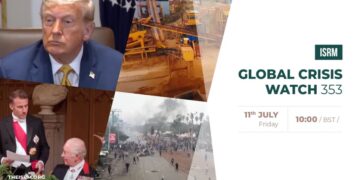The Institute of Strategic Risk Management, (ISRM), is inviting members and security professionals to its latest Global Crisis Watch, number 282, taking place tomorrow, Friday, July 5 at 10:00 BST. Topics of discussion will include Biden’s “debate debacle” putting the Democrats in crisis, the implications to the recent success of the far right political parties in France, rising tensions in the middle east between Hesbollah and Israel, and the recent change of leadership of NATO. Read more about the topics below.
Biden’s debate debacle put the Democrats in a crisis
Recent polling by CNN indicates that three-quarters of US voters believe the Democratic Party would have a better chance of retaining the presidency in 2024 with a nominee other than President Joe Biden. Biden’s approval rating has reached a new low, exacerbated by a shaky debate performance against former President Donald Trump, where Trump maintains a consistent lead in polls since last fall. Despite Biden’s campaign affirming his intention to stay in the race, Democratic insiders are discussing potential replacements, though such a move would be challenging logistically and politically risky.
Far right success in the election triggers riots and worries in France
Thousands gathered in Paris to protest the far-right National Rally’s strong performance in the first round of legislative elections. Organised by unions, media and citizen groups, the rally aimed to mobilise against the National Rally’s xenophobic and antisemitic history. There’s concern that a far-right victory could threaten civil liberties. Despite fatigue from repeatedly blocking the far-right, there’s a push to unify against them in the upcoming second round. French Prime Minister Gabriel Attal urged voters to prevent the National Rally from securing an absolute majority in the upcoming elections. The National Rally led the first round and is on target to govern if it wins over half the seats. Tactical voting and withdrawals of candidates from other parties aim to consolidate votes against the far-right, despite internal disagreements and concerns over coalition strategies.
Israel and Hezbollah tensions increase
Israel is actively preparing for a possible escalation of conflict with Hezbollah, a move underscored by ongoing challenges posed by Hamas despite its weakened state. As the Israeli military strategizes a phased withdrawal from Gaza, there is a concerted push for swift truce negotiations with Hamas. This strategic shift aims to redirect focus towards countering Hezbollah, whose formidable capabilities and Iranian backing pose a grave threat to Israeli security. Iran, which backs Hezbollah, has threatened a wider conflict if Israel strikes against their ally, turning this into a regional crisis.
In recent high-level meetings, including discussions involving Israeli Defense Minister Yoav Gallant and U.S. officials, plans have been outlined for international involvement in Gaza’s stabilization. Proposed measures include forming a multinational oversight board and training a new security force, albeit amidst skepticism about the feasibility of these efforts materializing swiftly. Israeli officials emphasize the need to contain Hamas’s influence while preparing defensively against Hezbollah’s substantial arsenal and military capacity, highlighting the delicate balance Israel must navigate to prevent further escalation in the region.
Mark Rutte takes over leadership of NATO, amids many challenges
Mark Rutte has been appointed as NATO’s next Secretary-General, succeeding Jens Stoltenberg starting October 1, amid critical security challenges in Europe, notably Russia’s ongoing conflict in Ukraine. Rutte, the current Dutch Prime Minister, secured unanimous support from NATO’s 32 member countries following the withdrawal of his rival, Romanian President Klaus Iohannis. This appointment marks a significant endorsement of Rutte’s leadership credentials and his staunch advocacy for collective security, describing NATO as pivotal in safeguarding international stability.
Rutte’s tenure comes at a pivotal juncture, with NATO grappling not only with external threats but also internal cohesion issues. His early backing from key NATO allies, including the United States and major European powers, underscores his diplomatic prowess and transatlanticist credentials. Despite initial reservations from Eastern European nations favouring regional representation, Rutte’s strategic promises and consensus-building approach ultimately garnered broad support within the alliance. As Rutte prepares to transition from Dutch politics after nearly 14 years as Prime Minister, his appointment heralds expectations of navigating complex geopolitical landscapes and balancing diverse interests within NATO. With a reputation as a crisis manager and a commitment to bolstering NATO’s defence capabilities, Rutte’s leadership will be closely watched as NATO continues to adapt to evolving global security challenges under his stewardship.
To register, click here
For more ISRM news, click here






